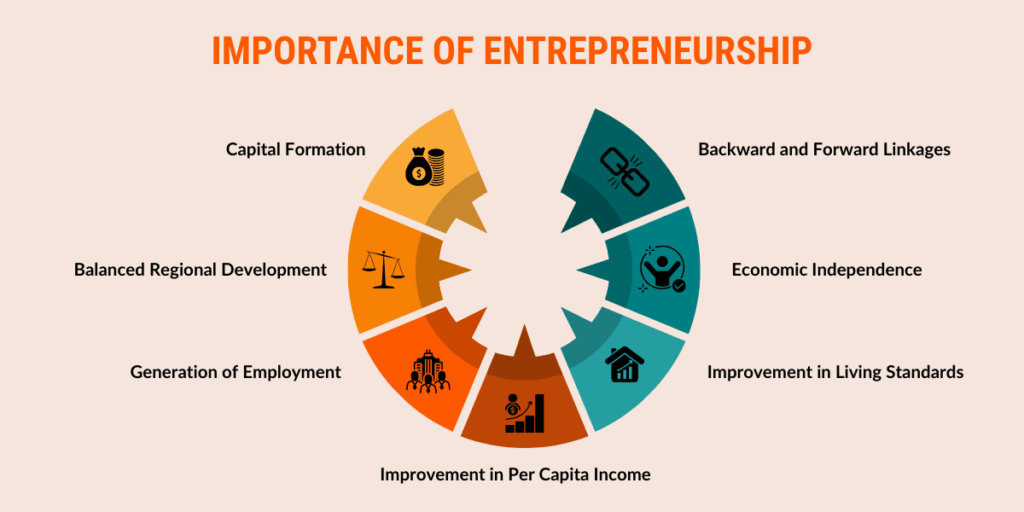

Quick Summary
India’s Entrepreneurship Evolution: From ancient Harappan trade to today’s booming startup ecosystem, India’s entrepreneurship journey reflects centuries of innovation and resilience.
Policy Push & Digital Growth: Landmark reforms like the 1991 liberalization, Startup India, and Digital India have boosted funding, eased business operations, and nurtured a thriving entrepreneurial culture.
2025 Economic Impact: Entrepreneurship in India now drives large-scale job creation, technological innovation, and inclusive economic growth—transforming livelihoods and fueling social progress nationwide.
Entrepreneurship in India has evolved dramatically—from ancient barter systems to today’s booming startup ecosystem. But what is entrepreneurship, and who is an entrepreneur?

An entrepreneur is someone who identifies opportunities, creates businesses, and generates jobs. Entrepreneurship involves building, managing, and scaling a business with clear, goal-driven strategies. In this article, In this article, we will focus on the following:
The evolution of entrepreneurship in India is a fascinating journey from traditional family-run businesses to a vibrant startup ecosystem. Over the decades, Indian entrepreneurs have transitioned from local traders to global innovators. This evolution reflects the nation’s shift in mindset—embracing risk, celebrating innovation, and leveraging technology to solve real-world problems. From the post-independence era to the digital revolution of today, entrepreneurship in India has become a key driver of economic growth and job creation.

To truly understand the growth of entrepreneurship in the country, it’s essential to explore the history of entrepreneurship in India. India boasts one of the oldest and most civilized business traditions in the world. As early as 2700 BC, during the Harappan civilization, internal and external trade practices were already well-established. This long-standing commercial culture has laid the foundation for India’s modern entrepreneurial spirit. Over centuries, India’s trading acumen has been acknowledged by various foreign nations, highlighting the global recognition of Indian entrepreneurial skills.
Moreover, the increase in trade occurred during the era of Mughal rule. The popularity of Indian products, arts, crafts, Vedic tools, foods, and much more attracted attention from different parts of the world. The Arab mainland, western colonial countries, and African countries were the major parties involved in the trade.
At the same time, countries like the UK, France, and Portugal expanded their colonies in different parts of the world. However, a significant entrepreneurial change occurred when the East India Company started its business from the Bay of Bengal and later occupied parts of Bengal. It indirectly linked the entire Indian state into one business ecosystem.
The colonial mindset of England had some significant downsides. However, it also had some positive aspects in developing entrepreneurship in India.
This was the era of industrialization in India, during which some of the country’s best entrepreneurs rose to prominence. Major events changed the face of entrepreneurship in India.
Entrepreneurship in India and the national economy were ground-breaking after independence. There was not much left in the Indian economy at that time. However, the government took significant steps to support India’s development, which is as follows.
As all these influential policies were in operation, few major industries were established, as opposed to the traditional textile and natural resource industries. Since independence, there has been a huge growth in entrepreneurship in India.
However, it may seem that most of the top entrepreneurs were already in business. The reality was different. Economic policies did not give much support to entrepreneurs, which resulted in rough growth. However, the transformation of entrepreneurship began in 1990.
Also, women entrepreneurship in India has witnessed remarkable growth in recent years, empowering women to become leaders in diverse industries and contributing significantly to the nation’s economic development
The major transformation of entrepreneurship in India began with the ‘Economic Policy Reform’ in 1991. The policy was further expanded in 2022. So, you can easily categorize the major transformation of entrepreneurs in India by these two policies and events.
The New Economic Policy of 1991 was a huge turning point. This policy has included three major aspects, which are as follows.
| Aspects | Role |
| Liberalization | Providing some provisions in different parts of the industry It boosts the private sector, including banks and the stock market |
| Privatization | Disinvestment of Public Firms to reduce the burden Promote the national entrepreneurs for good business |
| Globalization | Welcoming FDIs, and FPI Creating SEZ and Economic Corridor for foreign companies |
These were the most important of all the major aspects involved in the new economic policy. However, all of them played an important role in developing entrepreneurship in India. Some of the benefits that this policy replaced are as follows.
The major objective was economic reform, which has also transformed entrepreneurship in India. Before the policy, India’s entrepreneurship was based on the model of traditional industries and agro-industries.
However, after the implementation of the policy, major changes were seen in the technology. The rise of Infosys, TCS, Wipro, HCL, and more. Also, in automobiles, Maruti, Tata, Mahindra, Bajaj, and more were emerging. But there is a limitation to this policy as it favours a lot of big companies and does not give a chance to a small and new startup to take off.
In 2016, startups started to grow. There are some key aspects of this startup initiative whose main objective is to provide and lend support for entrepreneurship development in India. By the year 2015, startups were rampant in India. Moreover, India is also known as the “poster child of an emerging market”. Some of the key aspects of the 2016 Startup Initiative are as follows.
New innovators and potential entrepreneurs are helping their businesses in the Indian market daily. Considering the growth of entrepreneurship in India since 1990, you will see a sharp growth every year.
The current Indian entrepreneurship world is becoming a highly favorable market for any company to invest in. Also, most Indian companies have marked their potential in international trade and shown the growth of entrepreneurship in India. However, among all other top start-ups and companies, India’s IT sector is booming. It alone handles a large part of the development of the entrepreneur representing India.
Shark Tank India, the entrepreneurial reality show, has entertained viewers and sparked a revolution in the country’s startup culture.
The show provides a platform where dreams are pitched, ideas are analyzed, and the future of aspiring entrepreneurs is determined. The show has become very popular among the Indian audience, striking a chord with those who are passionate about entrepreneurship.
In a country where the startup culture is flourishing, Shark Tank India has emerged as a catalyst for change. The show provides a platform for budding entrepreneurs to showcase their innovative ideas to a panel of industry titans, offering a rare opportunity for mentorship, investment, and growth. The show unveils the hard work, perseverance, and determination that goes into establishing a business from scratch.
The show has become a beacon of hope for those who are undecided about embarking on the entrepreneurial journey. It proves that with passion, creativity, and strategic thinking, dreams can indeed come true.
The ‘Startup India’ initiative was launched by the Government of India on January 16, 2016, with the aim of promoting entrepreneurship, innovation, and startup culture in the country. The initiative was unveiled by the Prime Minister of India, Narendra Modi. The launch of ‘Startup India’ marked a significant step towards creating a more favourable environment for startups to thrive.
The Startup India initiative came with a comprehensive action plan outlining various measures and policies to support startups. This included initiatives related to simplifying regulatory procedures, providing financial support, offering tax incentives, and promoting innovation and skill development.
Contributing to the GOI’s vision of an ‘Aatmanirbhar Bharat’, the ‘Startup India’ initiative reflects the government’s commitment to fostering a culture of entrepreneurship and innovation, to position India as a global hub for startups.
Here’s how the initiative benefits the startup culture in India and contributes to the well-being of the youth:
‘Startup India’ focuses on simplifying and streamlining regulatory processes, making it easier for startups to register and operate. This reduces hurdles and encourages more aspiring entrepreneurs to take the leap of faith into starting their businesses.
The initiative aims to provide easier access to funding by establishing a dedicated fund for startups. It encourages financial institutions and investors to support innovative ideas and early-stage companies, helping them scale and grow.
Startups registered under the initiative can avail various tax benefits, including exemptions from capital gains tax, tax holidays, and a reduction in compliance costs.
The initiative emphasizes skill development and training programs to equip aspiring entrepreneurs with the necessary knowledge and skills to run successful businesses. The initiative has also launched the ‘Startup India Learning Program’.
The program aims to help entrepreneurs get their ideas and ventures to the next level through structured learning. The program covers lessons on key areas of entrepreneurship by 40+ top founders of India in an extensive 4-week Program.
The initiative facilitates market access for startups by connecting them with potential customers, both within India and globally. This helps startups scale their operations and tap into larger markets, contributing to their overall success.
‘Startup India’ fosters a collaborative environment by promoting networking opportunities through events, conferences, and industry interactions. This enables startups to connect with mentors, investors, and other entrepreneurs, facilitating knowledge exchange and collaboration.

The indirect effects of entrepreneurship are not so visible, yet they are equally important for economic development. The following are indirect effects:
The flow of money in an economy is as important. The more it flows, the healthier the economy. Enterprises help in the flow of money in the market by creating employment and increasing production and consumption.
Start-ups thrive in the ecosystem. When an ecosystem is formed in a particular city, there is an increase in the infrastructure of the city or particular area. For example, startups growing in Bangalore, Hyderabad and Delhi. These cities were developed strategically to create a better environment to support start-ups to meet the need for entrepreneurship.
Direct employment is the employment created by entrepreneurship within the business. But it is not the only employment. Entrepreneurship also creates a lot of indirect jobs. For example, in an area like Powai in Mumbai, infrastructural development creates a need for hotels, restaurants, transportation, etc.
When entrepreneurs grow and expand their operations, it requires many services. These services may be outside their core expertise. For example, an ed-tech start-up would require several services like human resources, marketing, consulting, legal services, etc. Therefore, when the number of entrepreneurs increases, so does the demand for related services.
Recommended Read: 10 Successful Entrepreneurs in India and their Net worth
Entrepreneurship is important because it improves the standard of living and generate capital. Let us look at some of the reasons for the importance of entrepreneurship.
It shows the importance of entrepreneurship in the best possible way. New products and services produced by entrepreneurs can fuel the economic development of the companies concerned. This is also true for areas that need to support new business.
For example, the boom of IT industries during the 1990s. The industry grew rapidly and it helped many other businesses. Businesses have grown in related sectors, such as call centre operations, network repair firms and hardware suppliers.
Entrepreneurial projects help create fresh wealth. Established companies may remain confined to existing markets and reach a threshold in terms of profits. Better goods, services or technology from businesses enable the development of new markets and the creation of new wealth.
Entrepreneurial projects help create new capital. Better goods, services or technology from businesses enable the development of new markets and the creation of new wealth. Also, higher income in the form of increased jobs and higher tax revenue and expenditure leads to better national income.
So, this importance of entrepreneurship helps in making the national income of a country. The government will use these proceeds to invest in the country.
This importance of entrepreneurship breaks with tradition and reduces reliance on outdated systems by providing unique products and services. This will improve the quality of life. Such as the smartphone industry continues to grow, tech entrepreneurship will have a huge, long-term impact on the planet.
Entrepreneurship is an instrument of social change and economic development. Entrepreneurs firmly believe that entrepreneurship will beat and transform the market with new-age technologies.

The following factors define why entrepreneurship is needed in economic development.
Innovation is the primary element of entrepreneurship. New-age entrepreneurs are passionate about innovations in technology and business models. Some of the primary examples of this are Airbnb, Innova8, Ola, Zinerr, etc. These companies not only innovate in technology but also create unique business models that never existed before. This helps make your life much easier.
Economic policymakers consider innovation when creating a road map for the country’s economic development. Innovation eases market access, creates new opportunities, and encourages consumption. Therefore, entrepreneurship in India is important as it inspires innovation.
Employment is an important factor in the development of any economy. A low employment rate indicates an economy’s poor health. To accelerate growth, an economy needs to generate more jobs and wage opportunities. Employment plays an important role in job creation.
The bigger the enterprise, the more job and salary opportunities are created. Therefore, the need for entrepreneurship in India becomes important for economic development.
The standard of living is, in a way, directly proportional to employment. Because employment pays people, they spend their money on purchasing goods and services. Therefore, the consumption rate increases in an economy, and so does the production rate. This eventually raises the basic wage, and people become able to consume higher quality goods and services.
If entrepreneurship in an economy is sector-agnostic, it will go a long way toward raising people’s standard of living. Therefore, the need for entrepreneurship in India becomes important for overall economic development.
Social entrepreneurship is a modern term that encourages entrepreneurs to bring about change in society. For example, crowdfunding companies are usually involved in social work such as raising funds for NGOs. Their businesses bring positive changes to society. They not only help the needy but also spread social awareness.
A prosperous society facilitates the path of community development. Therefore, the need for entrepreneurship in India is important as it brings together social reform and economic development.
Research and development are the progress of innovation. When an entrepreneur comes up with innovative ideas and builds a business from them, they need to continuously develop their innovation to keep up with the market and improve the user experience. As the enterprise grows, they spend more resources on research and development, which leads to technological progress.
Technological advancement not only supports a particular company but the entire nation. It contributes to the growth of science and technology. The economy further utilizes these developments to implement in various sectors to make progress. Therefore, the need for entrepreneurship in India is necessary for the progress of science and technology.
Entrepreneurship in India was on a rough path. Moreover, after independence, it had a terrible impact. However, with policies and hard work our country was able to overcome it at one point in time. Now with an innovative mind, India is gaining dominance in the market. And entrepreneurship opportunities will increase in India.
For policymakers and business owners, it is essential to consider the relationship between entrepreneurship and economic development. Knowing the pros and cons of entrepreneurship makes it possible to adopt a balanced approach. An approach to developing the importance of entrepreneurship, which can have positive economic and social impact.
Conclusively, we can look at various practical, direct and indirect factors that come into effect due to entrepreneurship. And why entrepreneurship is essential to an economy. We should not underestimate the impact of entrepreneurship on the economy. Entrepreneurship in India leaves a positive impact on the economy.

The future of entrepreneurship in India is bright and rapidly evolving. With supportive economic policies, increased digital adoption, and a thriving startup ecosystem, India is becoming a global hub for innovation. Entrepreneurship is creating new jobs, driving economic growth, and attracting significant domestic and international investments.
Entrepreneurship has certain important qualities. Those qualities include the ability to communicate accurately and effectively, leadership skills, the ability to sell products and ideas, having a vision for the future, being flexible, persistent, and collaborating. The most important thing in all this is vision. No entrepreneurship can survive and grow without a proper vision.
Entrepreneurship is the process of starting and running a business. Entrepreneurs are vital to the economy, using their skills to analyze the market and introduce new products. They combine capital, labor, and natural resources to produce goods and offer services.
There are several benefits of entrepreneurship for youths. You can learn many important skills that can be useful for your work and life. Along with this, you get to know about teamwork, how to manage a team, networking, creativity, problem-solving, communication, critical thinking etc.
Mukesh Ambani leads industries like petrochemicals, refining, oil, telecom, and retail. Ratan Tata heads a conglomerate with diverse interests including automotive, IT, and steel. Narayana Murthy is a pioneer in IT and consulting, co-founding Infosys. Azim Premji is a key player in IT and consulting, leading Wipro to global recognition.
Entrepreneurship is on the rise in India. Every year more and more businesses are booming in addition to the already existing business. In the last few years, India saw 50,000 startups out of which 8000 – 9000 are technology-based startups while there are more than 1300 new tech startups. According to the government, which will increase further.
The Indian government has launched initiatives like the Startup India Action Plan to boost entrepreneurship development, offering legal aid, tax benefits, and financial support through the ‘Fund of Funds’ scheme.
There are many entrepreneurs in India who have been in business for a very long time and still growing. Some of them are:
1. Jamsetji Tata – Tata Group
2. Kumar Mangalam Birla – Aditya Birla Group
3. Gautam Adani – Adani Group
4. JRD Tata – Air India
5. Dhirubhai Ambani – Reliance
6. Narayana Murthy – Infosys
7. Azim Premji – Wipro
8. Shiv Nadar – HCL
9. Ardeshir Godrej – Godrej Group
10. Jarnanalal Bajaj – Bajaj Group
India’s entrepreneurial landscape is thriving, driven by a surge in startups and innovation. Government initiatives like the Atal Innovation Mission (AIM) and the recent repeal of the ‘angel tax’ have bolstered this growth. Additionally, a growing number of Indian tech professionals are returning from Silicon Valley to launch startups in India, attracted by the expanding startup ecosystem and favorable business environment.
Subodh Kaushik: At 17, he founded Shopeepie.com, a fashion startup that has grown into a multi-million dollar business.

Authored by, Samiksha Samra
Digital Content Writer
Samiksha is a writer with a passion for sharing ideas and a knack for detail. She loves turning concepts into meaningful, engaging content. With a strong background in research and content strategy, she crafts clear, easy-to-understand narratives that resonate with readers. Her curiosity drives her to explore new subjects, ensuring every piece she creates is both insightful and impactful.
Editor's Recommendations
Chegg India does not ask for money to offer any opportunity with the company. We request you to be vigilant before sharing your personal and financial information with any third party. Beware of fraudulent activities claiming affiliation with our company and promising monetary rewards or benefits. Chegg India shall not be responsible for any losses resulting from such activities.
Chegg India does not ask for money to offer any opportunity with the company. We request you to be vigilant before sharing your personal and financial information with any third party. Beware of fraudulent activities claiming affiliation with our company and promising monetary rewards or benefits. Chegg India shall not be responsible for any losses resulting from such activities.